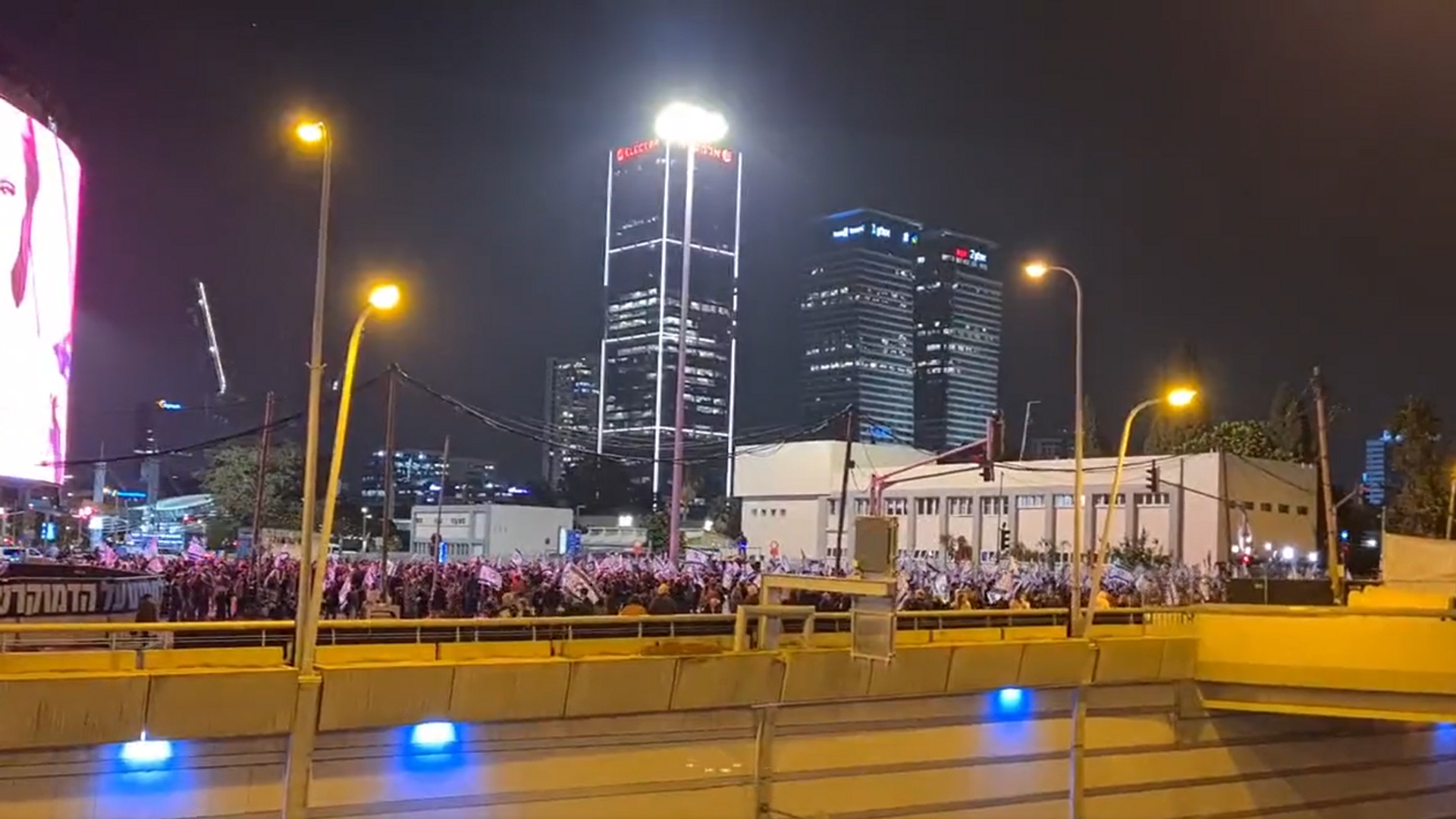https://sputnikglobe.com/20230305/tens-of-thousands-protest-against-legal-reform-in-israel-1108026739.html
Tens of Thousands Protest Against Legal Reform in Israel
Tens of Thousands Protest Against Legal Reform in Israel
Sputnik International
About 160,000 people have participated in yet another protest in Tel Aviv against the controversial Israeli judicial reform, The Times of Israel reports.
2023-03-05T00:30+0000
2023-03-05T00:30+0000
2023-03-05T00:34+0000
world
tel aviv
israel
protests
https://cdn1.img.sputnikglobe.com/img/07e7/01/15/1106561772_52:0:1314:710_1920x0_80_0_0_360e4cf6145ca11f5fc5d724301173a0.png
Israelis have been holding weekly protests against the reform for nine straight weeks. The Saturday protest came after the Constitution, Law and Justice Committee of the Israeli parliament, the Knesset, approved the second part of the controversial reform on Wednesday. The Times of Israel said on Saturday that about 160,000 attended the protest in Tel Aviv, and tens of thousands went out into the streets across Israel. The newspaper cited the organizers of the protests as saying that bout 400,000 Israelis demonstrated against the legal reform across the country on Saturday.According to the newspaper, police used water cannons to disperse the demonstrators in Tel Aviv. At least four people were detained in Tel Aviv during clashes with law enforcement, The Times of Israel said citing a police spokesperson. In January, Israeli Justice Minister Yariv Levin rolled out a legal reform package that would limit the authority of the Supreme Court by giving the cabinet control over the selection of new judges, as well as allowing the Knesset to override the court's rulings with an absolute majority. In mid-February, the Israeli parliament approved the first part of the legislation. The reform's opponents argue it will undermine democracy in Israel and put the country on the verge of a social and constitutional crisis. The current Israeli judicial system has been in place since the establishment of the state in 1948. In accordance with this system, the Supreme Court provides constitutional oversight, since Israel does not have a constitution and a constitutional court. Government decisions are largely controlled by the Supreme Court, which can overrule them if necessary.
tel aviv
israel
Sputnik International
feedback@sputniknews.com
+74956456601
MIA „Rossiya Segodnya“
2023
Sputnik International
feedback@sputniknews.com
+74956456601
MIA „Rossiya Segodnya“
News
en_EN
Sputnik International
feedback@sputniknews.com
+74956456601
MIA „Rossiya Segodnya“
Sputnik International
feedback@sputniknews.com
+74956456601
MIA „Rossiya Segodnya“
tel aviv, israel, protests, judicial reform
tel aviv, israel, protests, judicial reform
Tens of Thousands Protest Against Legal Reform in Israel
00:30 GMT 05.03.2023 (Updated: 00:34 GMT 05.03.2023) MOSCOW (Sputnik) - About 160,000 people have participated in yet another protest in Tel Aviv against the controversial Israeli judicial reform, The Times of Israel reports.
Israelis have been holding weekly protests against the reform for nine straight weeks. The Saturday protest came after the Constitution, Law and Justice Committee of the Israeli parliament, the Knesset, approved the second part of the controversial reform on Wednesday.
The Times of Israel said on Saturday that about 160,000 attended the protest in Tel Aviv, and tens of thousands went out into the streets across Israel. The newspaper cited the organizers of the protests as saying that bout 400,000 Israelis demonstrated against the legal reform across the country on Saturday.
According to the newspaper, police used water cannons to disperse the demonstrators in Tel Aviv.
At least four people were detained in Tel Aviv during clashes with law enforcement, The Times of Israel said citing a police spokesperson.
In January, Israeli Justice Minister Yariv Levin rolled out a legal reform package that would limit the authority of the Supreme Court by giving the cabinet control over the selection of new judges, as well as allowing the Knesset to override the court's rulings with an absolute majority. In mid-February, the Israeli parliament approved the first part of the legislation. The reform's opponents argue it will undermine democracy in Israel and put the country on the verge of a social and constitutional crisis.
The current Israeli judicial system has been in place since the establishment of the state in 1948. In accordance with this system, the Supreme Court provides constitutional oversight, since Israel does not have a constitution and a constitutional court. Government decisions are largely controlled by the Supreme Court, which can overrule them if necessary.


